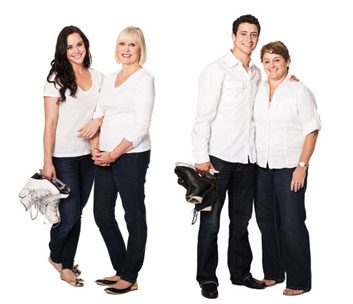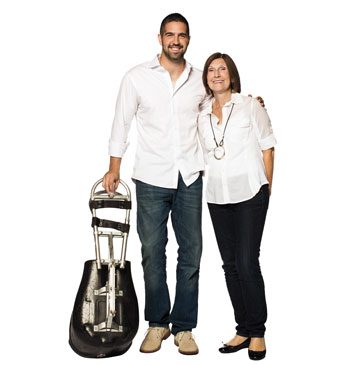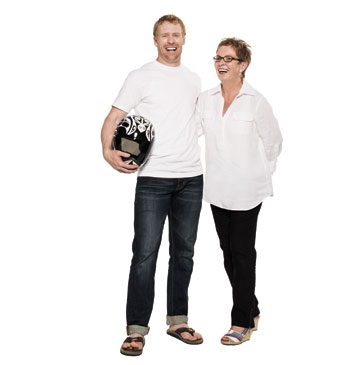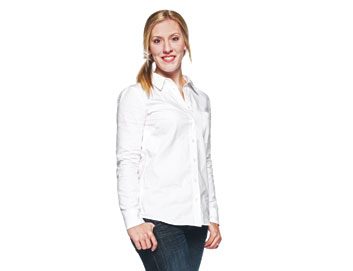
Tessa Virtue and Scott Moir
When they won gold in ice dancing at the 2010 Olympic Winter Games in Vancouver, Tessa Virtue, 24, and Scott Moir, 26, were the youngest winners in the history of the sport. Best Health spoke with the platonic pair from London, Ont.
BH: Heading into the 2014 Games, do you feel less or more pressure than in 2010?
Tessa: We feel the nerves more. After Vancouver, it’s like anything other than first or second would be a failure. We want to represent Canada well; we put a lot of pressure on ourselves.
BH: How do you cope with the pressure?
Scott: We are confident in our process; we stick with what works.
Tessa: We can look to each other for comfort and reassurance. Just being able to talk about things and communicate openly makes a huge difference. I can’t imagine going through this alone.
BH: What is your training schedule like?
Scott: We’re on the ice five hours a day. Then we’ll hit the gym, or do ballet and ballroom dance, followed by physio and massage. Then we do it all again next day.
BH: How do you get into that pre-competition zone?
Tessa: Getting into character and putting on makeup has become a part of my routine. Looking and feeling good makes a big difference because so much of what we do is aesthetic.
Scott: For me, confidence in how I look is a huge thing. You have to carry that with you in a performance.
BH: What impact have your moms had on your careers?
Tessa: They’ve been there all the while. We couldn’t do what we do without them.
Scott: They have never pushed us to do anything we didn’t want to do. Our moms are great role models. We have always felt such balance because of them.
BH: What are you most looking forward to in Sochi?
Tessa: I’m so excited about being in the athletes’ village with other Canadians. That camaraderie is unique to the Games; You’re part of something bigger. Wearing Canada on our backs is wonderful and very uniting.
Scott: The Canadian Olympic family is tighter than anything I’ve been part of. That sense of team, and cheering for a winning moment your fellow Canadian is having, is what I’m most looking forward to.
BH: What lessons did you take from your first Olympics?
Scott: That it’s important to enjoy the process, and the biggest perk is being the best you can be. We’re working hard and enjoying this beautiful moment in our career.
Tessa and Scott (pictured with moms Kate and Alma) are sponsored by P&G’s Pantene, CoverGirl, Olay and Crest brands.

Greg Westlake
Greg Westlake was born with a congenital abnormality that resulted in the amputation of both his legs when he was 18 months old. But that didn’t stop him from playing hockey, a game he’s loved since learning to skate at the age of three. Growing up in Manotick and Oakville, Ont., he was inspired to take up the sport by his older brother, Scott. Recalls his mother, Deborah (pictured), “As far as Greg was concerned, he was going to be exactly like his big brother and someday play in the NHL.” Westlake agrees. “When I was young, I didn’t know I was different, so I just did what everybody else was doing. I was always a fighter. My parents didn’t coddle me.”
Westlake was good at road hockey, roller hockey and ice hockey, but he wanted to find a sport where he could compete at the highest levels. So, at age 15, he turned to sledge hockey. Played by athletes with a physical impairment on the lower part of their body, the sport follows the rules of the International Ice Hockey Federation, with modifications. Players manoeuvre on a double-bladed sled while handling two sticks-each with a spiky end for pushing and a blade end for shooting-to pass the puck across the ice.
The transition wasn’t always easy for Westlake: It was hard to learn how to control the sled and play the game. But he persevered: “He was determined to do it,” says his proud mom, who is featured with Westlake in his sponsor Procter & Gamble’s “Thank You Mom” campaign. “That is inspiring for me.”
Today, the 27-year-old is the right winger and captain for Canada’s National Sledge Team, and has competed in two Paralympic Winter Games, including Turin in 2006, where his team took home gold. Westlake and his team are headed to Sochi for the Paralympic Winter Games, which start on March 7. His event begins on March 8, and the gold-medal game is to take place on March 15.
He has also won two IPC Sledge Hockey World Championships. One of the biggest thrills for him was being the captain of the winning team in 2013. “Leading a team really gave me a lot of confidence,” he says. “I can’t spend too much time focusing on myself; I have to focus on my teammates.”
Those teammates have been an inspiration for Westlake since he first took up sledge hockey. “I had never played a Paralympic sport or a disabled sport in my life up until then,” he says. “On my team, there was one player who lost his leg in Afghanistan, serving our country. There were cancer survivors. These guys have gone through some pretty hard situations and came out the other side still wanting to be athletes, work hard, and be ambassadors in the community. Being around them every day helped me grow up.”
Another one of Westlake’s role models is Terry Fox: “He made it kind of cool to be an amputee and I appreciate what he did for people in my situation.” A big believer in paying it forward, Westlake also spends a lot of his time giving back. He is particularly proud of his participation in Soldier On, a program for soldiers who were injured or became ill while serving in the Canadian Forces. He also loves working with children. “When a kid reaches out to me because he’s missing his legs, I can return that personal attention.”
Heading into the Paralympics, the Canadians are the defending world champion in sledge hockey, while the U.S. team is the defending Paralympic Winter Games champion. Westlake is confident that his team will put on some great performances: “This team works hard and every guy’s in great shape. I think we’ll get a good result.”

Jon Montgomery
Racing head-first down a frozen track at 140 kilometres an hour is no sweat for skeleton racer Jon Montgomery, 34. What is he truly afraid of? “I’m petrified of needles,” he says. ? “The last time I gave blood, I passed out.”
Born in Russell, Man., he was working as an auctioneer in Calgary in 2002 when he saw a skeleton race at Olympic Park. From then on, he was hooked. Montgomery credits his parents with encouraging him to try new things. “My mom didn’t push me to become an Olympian or a superstar; she pushed me to experience life and to challenge myself. I was able to find my passion, something I could call my own. I wouldn’t be where I am today without my parents.”
Montgomery went on to win a gold medal at the Vancouver Olympics in 2010. He also won a place in Canadians’ hearts when, after his win, he drank beer from a jug while marching through Olympic Village in Whistler.
So, has he planned his victory walk for the 2014 Winter Games? “Oh no,” he laughs. “That would be putting the cart before the horse and as Prairie folk, we don’t like to do that. I’m going to do everything I can between now and then to make sure that the result is as good as it can be. And I believe, wholeheartedly, that I can come home with a medal.”
Montgomery, who in 2013 hosted the first Amazing Race Canada, is hopeful his wife-fellow “skeletor” Darla Deschamps-will medal, too, making them the first married couple in Olympic history to do so in individual sports. Here are his thoughts on gearing up for intense competition.
Find your motivation “I’m internally motivated. I’m not worried about what others are doing; I’m worried about how good I was yesterday and how good I want to be today. That pushes me to be better.”
Train hard “Right now I’m in full-time training mode, eight to 10 hours a day, which keeps me occupied and out of trouble. That includes active recovery through physio and massage, as well as preparing nutritious meals. Everything that I do is weighed against whether it’s bringing me closer to my goal of defending a gold medal in Sochi.”
Keep perspective “Skeleton is a cerebral sport. But pressure is what you make of it. It can be overwhelming for those who build it up in their heads. It’s a sporting event, and a way to see how you measure up against the world’s best. What you use sport for can be profound and life-changing for yourself and others. But it’s sport, it’s fun, and it’s something you should feel lucky to be able to do.”
Pictured: Jon and his mom, Joan

Meghan Agosta-Marciano
Canada’s women’s hockey team is competing for a fourth consecutive gold medal. The stakes are high, but two-time Olympic gold medallist Meghan Agosta-Marciano, who plays forward, is taking it one game at a time: “Every game is a battle and an opportunity for us to get better.”
The battle she’s looking forward to? “I look forward to every game and every team I play. Of course, Canada and the U.S. are rivals,” admits Meghan, who is from Ruthven, Ont., and is married to one of the team’s coaches, Marco Marciano. The first time the two teams face each other is in the preliminary rounds on Feb. 12, which just so happens to be Meghan’s 27th birthday. The final is slated for Feb. 20.
The tournament MVP at the 2010 Vancouver Games has some perspective: “Then, I was a rookie. Now, it’s my turn to take the younger players under my wing.” Giving of herself to her teammates is important, as is the foundation she has set up to financially help children play hockey.
BH: What drew you to this sport?
Meghan: My brother inspired me to play. I wanted to do everything he did. He’d be on the street playing road hockey with the neighbourhood kids and I’d be right behind him. I have always had that passion and love for the game since I was a little girl.
BH: What motivates you to keep at it?
Meghan: It’s not about the gold medals; it’s about giving back and trying to inspire someone to do something special. Helping grow the women’s game also motivates me to be my best.
BH: Who do you admire?
Meghan: Growing up, I looked up to Cassie Campbell [former captain of the Canadian women’s team] and Steve Yzerman [former captain of the Detroit Red Wings]. Today, I look up to every one of my teammates. They’re so talented.
BH: What impact has your mom had?
Meghan: She told my dad to let me play. My dad didn’t want his little girl getting hurt, but my mom put the bug in his ear. That’s why I’m so happy she’s being recognized by my sponsor P&G through the “Thank You Mom” campaign and their brand Bounty. She’s the ultimate hockey mom, and I’m so thankful for all she has done for me.
BH: Growing up, you played on a boys’ team because there was no girls’ team. Are things different for girls today?
Meghan: I think there are so many great female hockey players in the game today. Girls’ hockey is much more competitive. And after every Olympics, there are even more girls registering to play this amazing sport.
BH: What are you looking forward to most at the Olympics?
Meghan: I’m looking forward to playing the game I love, representing my country and having the chance to bring home another gold medal. When I think Canada, I think nothing but gold.
Related:
• Sochi 2014: New Olympic events
• Sochi 2014: Healthy Russian foods
• Sochi 2014: Canadians to watch
